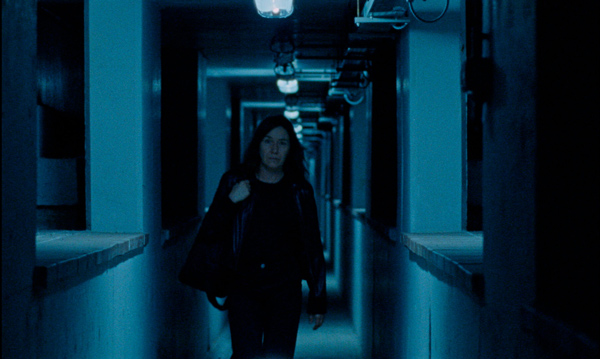Other Mothers: Iriarte’s Debut a Murky Mix of Neo Noir and Melodrama
 For his film debut Foremost the Night, Víctor Iriarte frames his peculiarly staged narrative through the words of famed Chilean novelist Roberto Bolano, quoting his 1999 novella Amulet. The passage confirms this will be a story about a terrible crime, but it will not appear to be so because it’s being told from a personal perspective. This is a story focused on the ‘who’ rather than the ‘what’ or ‘why,’ and thus takes on an automatically enigmatic tone thanks to the dramatic catalysts which inextricably frame the story, the details of which are fuzzy, out-of-focus horrors which the audience will be forced to fill in the pertinent details about, making everything feel all the more sinister. Iriarte employs two of Spain’s most fascinating actors, Lola Dueñas and Ana Torrent (who has been a fixture of arthouse cinema since her debut as the young girl in Victor Erice’s The Spirit of the Beehive, 1973) as two mothers who are united through tragedy.
For his film debut Foremost the Night, Víctor Iriarte frames his peculiarly staged narrative through the words of famed Chilean novelist Roberto Bolano, quoting his 1999 novella Amulet. The passage confirms this will be a story about a terrible crime, but it will not appear to be so because it’s being told from a personal perspective. This is a story focused on the ‘who’ rather than the ‘what’ or ‘why,’ and thus takes on an automatically enigmatic tone thanks to the dramatic catalysts which inextricably frame the story, the details of which are fuzzy, out-of-focus horrors which the audience will be forced to fill in the pertinent details about, making everything feel all the more sinister. Iriarte employs two of Spain’s most fascinating actors, Lola Dueñas and Ana Torrent (who has been a fixture of arthouse cinema since her debut as the young girl in Victor Erice’s The Spirit of the Beehive, 1973) as two mothers who are united through tragedy.
Vera (Duenas) was forced to give up her son for adoption as a young mother. Years later, she tried to find him, but was told her file had been lost. Though a professional by day, Vera also works as a go-between for obscure criminal entities by night, and finds an opportunity to blackmail an individual who has access to the information she seeks. It would appear Vera was one of hundreds of women whose children were swindled away en masse, but she is able to locate Egoz (Manuel Egozku), now a teenager. She is also in contact with his guardian, Cora (Ana Torrent), who is sympathetic towards her child’s situation as she had been told Vera was dead. Cora follows Egoz to his appointment with Vera and the three of them bond in a remote cabin on the Douro River. Vera informs them she has access to information regarding other families in a similar situation and she suggests the three of them embark on a quest.

Iriarte divides his film into four chapters, each headlined by a mysterious progression, though they’re barely outlined puzzle pieces which overlap rather than fit conveniently together. As Vera, Duenas exudes an aura of dangerous possibility (which the actor excels at, expertly playing the impassioned and imbalanced lead in Fabrice du Welz’s take on The Honeymoon Killers in 2014’s Alleluia), a nefarious nighttime figment lodged in a seedy underbelly of shady dealings. Her blackmail of a law enforcement officer seems to make sense, an extension of the newspaper headline montages regarding black market adoptions, of which she was the victim of. Her reunion with her son and the inclusion of his adoptive mother Cora feels like a woozy nightmare, and Iriarte’s narrative gets more interesting when they unite. What follows is a sort of strange symbiosis in the vein of Hitchcock, where the mothers become doubles, donning blonde hair, comparing appendages which align them as doppelgängers physically and spiritually.
The third act ties together a clutch of phantom metaphors, such as Vera’s day job teaching stenography, and Cora’s profession as a piano teacher, comparing the similarities in their skills, not to mention the phantom spasms they both experience relating to their jobs. In the final moments of Foremost the Night, where a self-play piano is showcased, it suggests a spiritual connection across realms and realities, where time, music, and memory can coalesce. As the three of them unite in a devious plan of vigilantism against those who’ve wronged them, it seems a bid to regain lost time, a ghostly essence which can only be regained through something drastic. Iriarte’s film is indeed about a terrible crime, but as Bolano’s statement has promised us, the narrative never feels this way, instead presenting fractures shards of people torn asunder, reunited through the criminality which has defined their lives.
Reviewed on September 2nd at the 2023 Venice Film Festival – Giornate degli Autori. 109 Mins
★★★/☆☆☆☆☆


